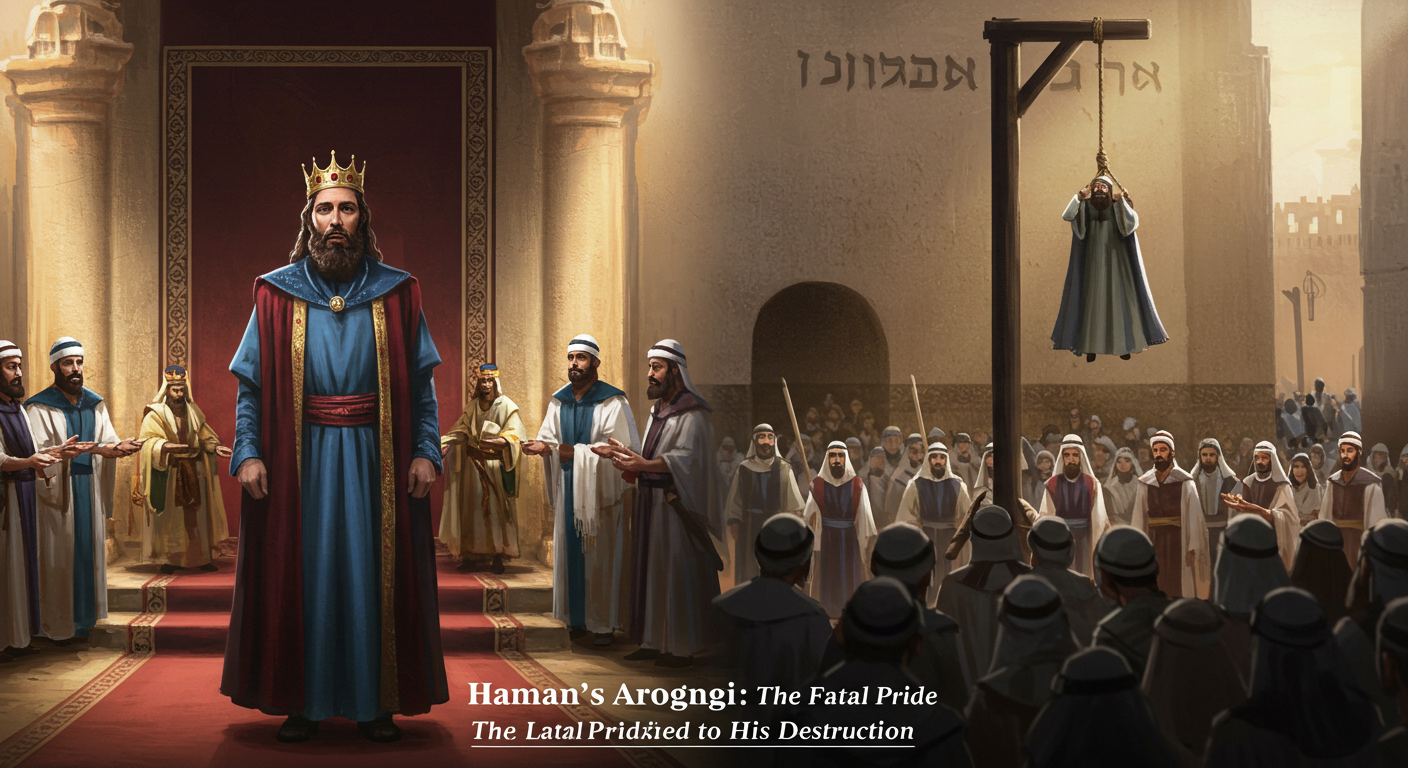Haman’s Arrogance: The Fatal Pride That Led To His Destruction
If there is a story that vividly explores the concept of pride preceding fall, Haman’s tale is definitely it. This narrative, which unfolds dramatically within the Book of Esther, serves as a cautionary example of how unchecked arrogance can lead to a swift and unfortunate downfall. By examining Haman’s pride, we unravel the intricate layers that portray the disastrous effects of hubris.
Haman: The Man Behind the Pride
Haman was not just any ordinary man in the Persian Empire; he was the prime minister under King Xerxes I. This was a position of considerable power and influence, and it undoubtedly contributed to his inflated sense of self-importance. Haman’s pride was not just personal but institutionalized through his official status. This pride fueled his actions and, unfortunately, his demise. After all, when you’re at the top, you might be tempted to look down on those below. But as Haman learned, being at the top can also mean that the fall is a lot harder.
The Root of Haman’s Pride
The origins of Haman’s pride can be traced back to his rise to power. Haman was elevated to a highly esteemed position, and with power comes the temptation of arrogance. Haman’s pride began to bubble over when he was honored above all other nobles and padded his ego by surrounding himself with opulence and privilege. His privileged status was recognized and acknowledged kingdom-wide, and with this acknowledgment, his pride began to swell uncontrollably.
The Moment of Discontent: Mordecai’s Refusal
Haman’s pride reached its critical turning point due to one man’s refusal: Mordecai. Mordecai’s refusal to bow down to Haman ignited a deeply seated rage in the latter. This act of defiance was more than just an affront—it was a direct challenge to Haman’s authority and self-image. Mordecai’s unwavering ability to stand firm in his beliefs against a man like Haman is a testament to courage in the Scripture. For Haman, it was an intolerable insult that fueled his wrath and desire for vengeance.
The Plan to Destroy the Jews
Once Mordecai defied him, Haman’s prideful nature couldn’t just target a single individual; he had to make a statement. Thus, Haman concocted a plan that involved the destruction of all Jewish people in the empire, thinking this would quench his need for revenge. Under the guise of removing a supposed threat to the empire, Haman persuaded King Xerxes to decree the annihilation of the Jewish people. Haman’s pride had now morphed into a deadly scheme, as he believed eliminating an entire community would restore his wounded ego and secure his authority indefinitely.
Haman’s Pride Showcased in Banquets
Interestingly, Haman’s downfall began to crystallize at banquets, where he frequented as an honored guest. During one such occasion, Queen Esther invited King Xerxes and Haman to a private banquet. Little did Haman know that this setting, which originally seemed to celebrate his prominence, was the stage for his undoing. Haman’s pride blinded him to the nuances of what was occurring around him and the true purpose of the banquet.
Esther’s Revelation and Xerxes’ Realization
The turning point that led to Haman’s downfall unfurled during a subsequent banquet, where Esther revealed her Jewish identity to King Xerxes. Esther boldly exposed Haman’s plan and its direct threat to her and her people. King Xerxes, suddenly realizing the gravity of the situation and the threat Haman posed to Esther’s people, reacted swiftly. In that moment, the unraveling of Haman’s carefully curated reputation commenced.
Esther 7:3NIV captures this pivotal moment: “Then Queen Esther answered, ‘If I have found favor with you, Your Majesty, and if it pleases you, grant me my life—this is my petition. And spare my people—this is my request.'”
Irony of the Gallows
One of the most striking aspects of Haman’s story is the irony that accompanies his downfall. Haman had prepared gallows to execute Mordecai, who had, ironically, once saved the king’s life. However, in an unexpected twist of fate, these very gallows became the instrument of Haman’s execution. Haman’s pride, which had orchestrated the construction of the instrument for another’s demise, now ensured his own Esther 7:9-10.
The Dramatic Reversal of Fortune
The ultimate irony and profound reversal of fortune stand as one of the most compelling elements of Haman’s story. Pride truly blinded Haman to the vulnerabilities of his position and the significance of the lives he so easily dismissed. His plans and machinations backfired spectacularly, illustrating the poetic justice that often accompanies tales of arrogance and hubris.

Haman’s Pride as a Universal Lesson
While Haman’s story is deeply rooted in historical context, it serves as an enduring lesson for contemporary society. Pride remains a double-edged sword that can swiftly lead to one’s downfall. Haman’s pride is a reminder that unchecked arrogance blinds individuals to their own faults and the reality around them. Instead of seeing their situation clearly, the prideful are often entangled in an illusion of invincibility, ignoring warning signs and wisdom from others.
The Role of Humility as an Antidote
One of the takeaways from Haman’s fall is the importance of humility. While pride unchecked can lead to catastrophe, humility opens the door to learning, growth, and greater understanding. By cultivating humility, individuals are more likely to embrace others’ perspectives, fostering compassion and wise decision-making. Haman’s pride blinded him to the consequences of his actions and the well-being of others, highlighting the importance of balance between self-assurance and humility.
Haman’s Story as a Cultural and Spiritual Narrative
Haman’s story has been referenced in various cultural and religious contexts as a symbol of pride leading to downfall. As a spiritual narrative, it compels believers to reflect on moments of personal pride and seek pathways of introspection and humility.
The Role of Religious Teachings
Religious teachings often underscore that pride is not just an individual character flaw but a broader spiritual challenge. Haman pride demonstrated the danger of placing oneself above others and God. Many religious texts and teachings assert the importance of recognizing not only the temporary nature of earthly power but also the divine providence and justice that ultimately prevail.
Transforming Hubris into Humility
Whether in political, personal, or professional settings, the lessons from Haman’s downfall remain relevant. Reflecting on Haman’s story can inspire individuals to recognize and transform their pride into humility. Learning to acknowledge one’s limitations, engage in self-reflection, and be receptive to feedback are essential steps toward transforming hubris into a more grounded, humble existence.
Strategies to Cultivate Humility
- Self-awareness: Regularly reflecting on personal behavior and motivations can help identify areas where pride may have crept in.
- Listening to Others: Valuing others’ perspectives fosters respect and collaborative problem-solving.
- Gratitude Practice: Acknowledging the contributions of others and being thankful for what you have can keep arrogance at bay.
- Service to Others: Engaging in acts of kindness and volunteering can cultivate empathy and remind us of the value of community.
Inviting the Reader: Reflect and Engage
Haman’s story of pride and downfall is a powerful reminder of the perils of arrogance and the value of humility. As life’s challenges test your character, remember Haman’s journey. Let it guide you in transforming pride into an opportunity for growth and connection with others. If this exploration of Haman’s pride and its lessons resonated with you, consider offering a clap, leaving a comment with your thoughts, and subscribing to my Medium newsletter for more reflections and narratives.
Explore More
For further reading and encouragement, check out these posts:
👉 7 Bible Verses About Faith in Hard Times
👉 Job’s Faith: What We Can Learn From His Trials
👉 How To Trust God When Everything Falls Apart
👉 Why God Allows Suffering – A Biblical Perspective
👉 Faith Over Fear: How To Stand Strong In Uncertain Seasons
👉 How To Encourage Someone Struggling With Their Faith
👉 5 Prayers for Strength When You’re Feeling Weak

📘 Jesus and the Woman Caught in Adultery – Grace and Mercy Over Judgement
A powerful retelling of John 8:1-11. This book brings to life the depth of forgiveness, mercy, and God’s unwavering love.
👉 Check it now on Amazon
As a ClickBank Affiliate, I earn from qualifying purchases.
Acknowledgment: All Bible verses referenced in this article were accessed via Bible Gateway (or Bible Hub).
“Want to explore more? Check out our latest post on Why Jesus? and discover the life-changing truth of the Gospel!”








